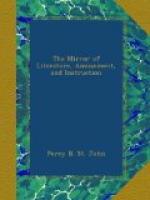Thus, we have the Origin of the Drama—Rise of the Drama in England—Early English Theatres—Descriptions of all the London Theatres—and a pleasant chapter on the Italian Opera. The Appendix contains pithy chronologies of the dramatists and actors, bygone and contemporary—origin of all the varieties of the drama—the topography of the stage and scenery, costume—expenses of the theatres—masquerades—play-bills and editions of plays, and a host of theatrical customs. In truth, the book is as full as the tail of a fine lobster, and will doubtless repay the time and research which its preparation must have occupied. There is also a, frontispiece of the fronts of the twelve London Theatres.
* * * * *
ORNITHOLOGY.
Mr. James Jennings has favoured us with a copy of his Ornithologia; or the Birds, a poem; with copious Notes; &c. The latter portion is to us the most interesting, especially as it contains an immense body of valuable research into the history and economy of birds, in a pleasant, piquant, anecdotical style, without any of the quaintness or crabbedness of scientific technicality. Mr. Jennings’s volume is therefore well adapted for presentation to young persons; whilst the knowledge which it displays, entitles it to a much higher stand than a mere book of amusement. To illustrate what we have said in its praise, the reader will find in the Supplement to the present Number, two or three of the most attractive Notes under “THE NATURALIST,” which likewise contains Three Engravings of very curious subjects in other departments of Natural History.
* * * * *
CONVERSATIONS ON GEOLOGY.
We have already spoken in favourable terms of this volume. It consists of 15 conversations of a family circle, comprising a familiar explanation of the Huttonian and Wernerian systems; the Mosaic geology, as explained by Penn; and the late discoveries of Buckland, Humboldt, Macculloch, and others. By way of specimen, we take a portion of a conversation which introduces the very interesting subject of the formation of coal:
Edward.—As the Huttonians evidently fail in proving coal to be produced by fusion, I hope the Wernerians may succeed better, for I should be sorry if so interesting a subject were left unexplained.
Mrs. R.—To understand their account, it will be requisite for you to recollect the process of the formation of bogs and marshes, as it is from these that Werner derives coal. What I told you, also, of the change produced on wood by being long exposed to moisture and kept from contact with the air, will be of use here, as wood, in all stages of change, is often found in coal-fields, in the same way as in peat-bogs.
Edward. That is a very strong circumstance in favour of the alleged origin.




